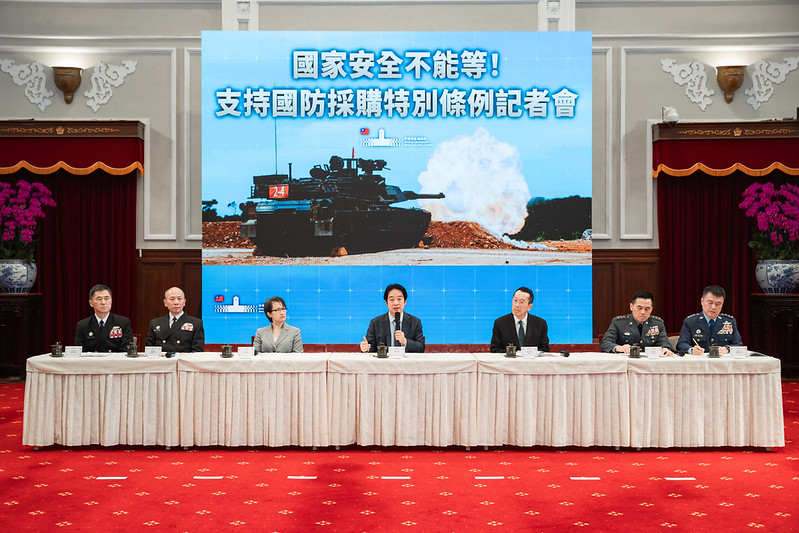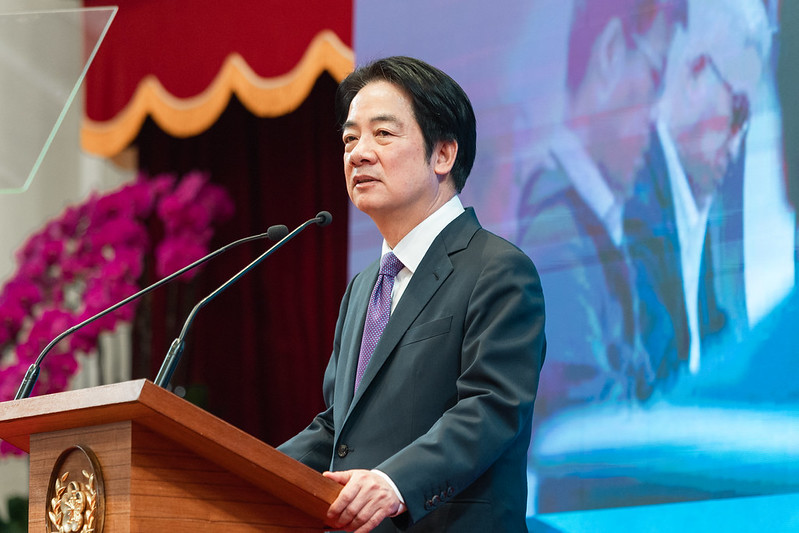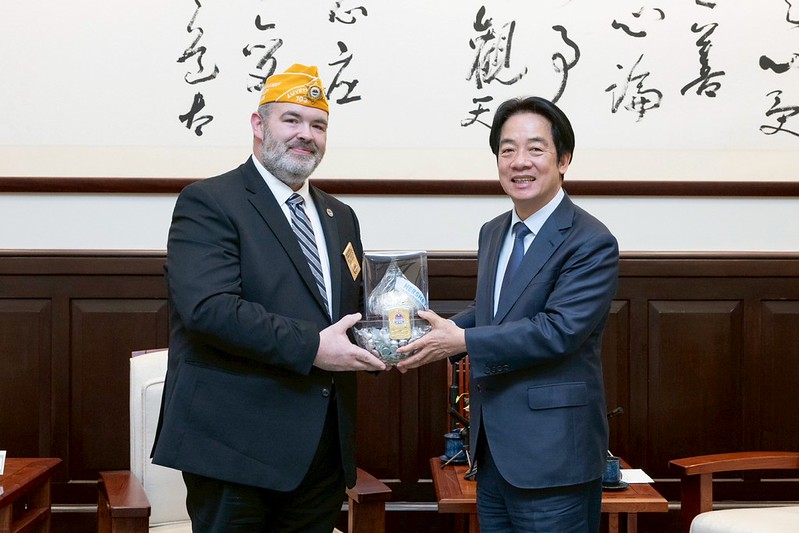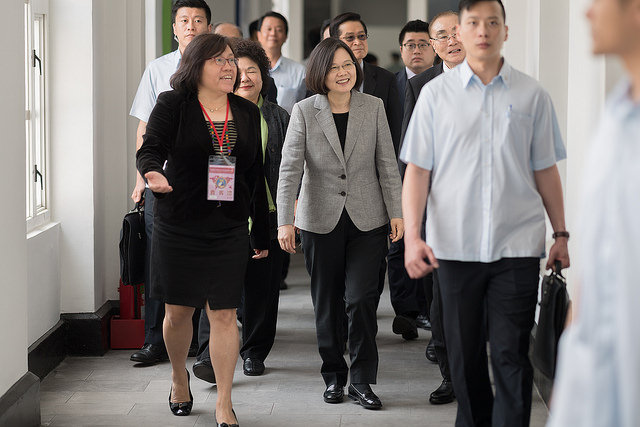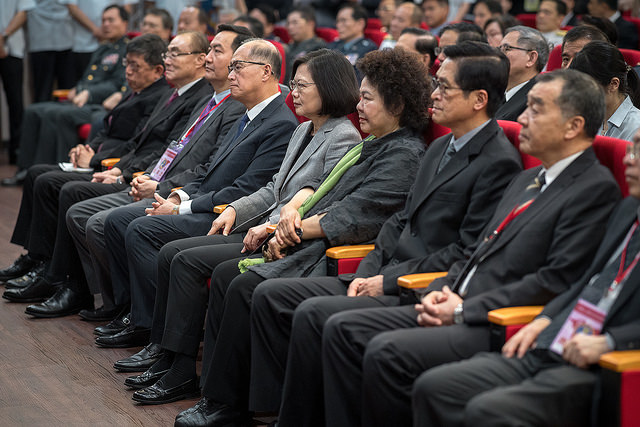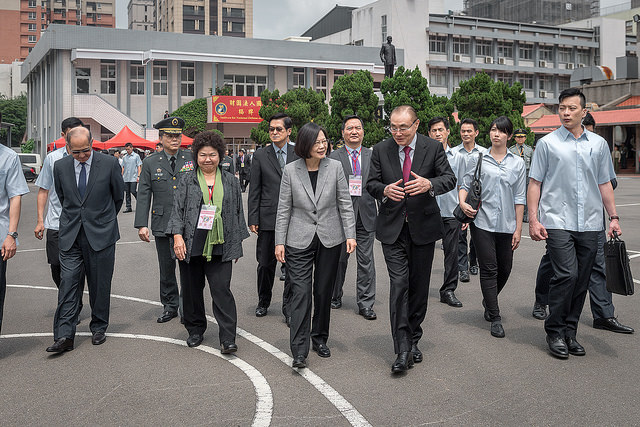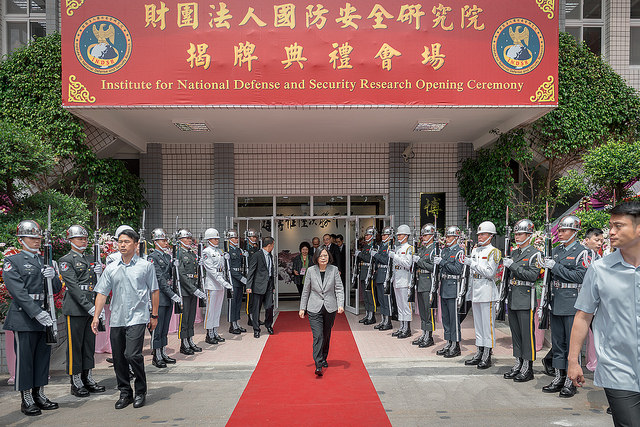News & activities
 News releases
News releases
President Tsai Ing-wen attended the inauguration ceremony for the Institute for National Defense and Security Research on the morning of May 1. The president expressed her three expectations for the institute: helping the government come to grips with changes in the strategic situation; recruiting widely to find strategic research talent; and becoming a platform for external exchanges, interaction, and cooperation. She also issued a statement regarding the termination of the diplomatic relations between Taiwan and the Dominican Republic. Taiwan's diplomatic situation is truly grim, she said, however, the government will not stoop to compromise by sacrificing national sovereignty or the dignity of our people.
The following is a translation of President Tsai's remarks:
This morning, there was a severance of diplomatic relations, so everyone is a bit downhearted. Taiwan officially terminated diplomatic relations with the Dominican Republic. As everyone is well aware, the Beijing authorities are once again suppressing Taiwan. Now is the time for solidarity. The interests of political parties cannot take precedence over the interests of the nation. So I hope the ruling and opposition parties will set aside their differences, and show the outside world that we stand as one.
I want to take this opportunity to express the government's solemn stance. Dispatching military airplanes and naval vessels around Taiwan, and suppressing Taiwan's foreign diplomacy are hostile acts that harm cross-strait relations. The people of Taiwan are disappointed to see these acts, which only increase the number of variables in cross-strait relations.
These acts have substantively harmed the cross-strait status quo, and do not respect Taiwan's democratic system. China has unilaterally altered the cross-strait status quo of stability. A responsible, major power will not adopt that kind of approach and attitude.
Taiwan's diplomatic situation is truly grim. However, the government will not stoop to compromise by sacrificing national sovereignty or the dignity of our people.
The government's mission is to defend the nation, protect Taiwan and the freedoms of our democratic way of life, and not tolerate any threat to these fundamental values. And that mission will not change.
When I was elected president in 2016, the people of Taiwan used their ballots to send the international community a message stating what they want: dignity, freedom, and democracy. No matter how great the external pressure, we will not submit. Taiwan's determination to embrace the world absolutely will not change.
Addressing severe challenges highlights the necessity of establishing a national defense think tank.
Here, I want to inform Chairman Feng Shih-kuan (馮世寬), our former national defense minister, about my three expectations for the Institute for National Defense and Security Research:
First, the institute will help the government come to grips with changes in the strategic situation.
In changing circumstances, our mission remains the same: To protect national security, and defend our national interests. The Institute for National Defense and Security Research will therefore propose concrete strategy directions. It will also provide, on a regular basis, reports on the regional security situation, and national defense technology trends. That will give policy-makers a comprehensive understanding of changes in the strategic environment.
Second, the institute must recruit widely to find strategic research talent.
Security strategy research is an interdisciplinary field. So in the future, the institute will have to take a broad-based approach, and recruit across a wide range of military and civil disciplines, to find strategic and military research personnel. Their collective wisdom and solid research will create a strong foundation for national development.
Third, the institute will become a platform for external exchanges, interaction, and cooperation.
The more difficult Taiwan's international situation becomes, the more we need to go out into the world. But academic exchanges can give us another channel to expand external communication. So we want to strengthen our dialogue with the countries in our region; set up channels for institutionalized interaction; increase strategic trust among all parties; and create possibilities for greater cooperation.
The institute's primary tasks are to strengthen national defense research, and expand communication and dialogue. During his tenure as national defense minister, Chairman Feng and I had a mutual understanding. I gave him tasks, and he always delivered. This time, I've given him a new task as chairman of a new research institute for national military strategy, and we expect that once again, he will deliver. So let's all work together, and protect the nation. Thank you!
Among those attending the event were Secretary-General to the President Chen Chu (陳菊), National Security Council Secretary-General David T. Lee (李大維), Executive Yuan's Minister without Portfolio Lo Ping-cheng (羅秉成), Minister of National Defense Yen Teh-fa (嚴德發), Minister of the Veterans Affairs Council Chiu Kuo-cheng (邱國正), and many members of the foreign diplomatic corps stationed in Taiwan.

